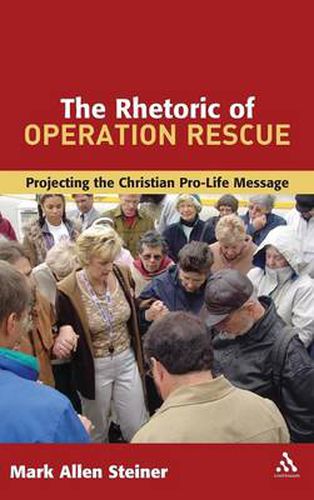Readings Newsletter
Become a Readings Member to make your shopping experience even easier.
Sign in or sign up for free!
You’re not far away from qualifying for FREE standard shipping within Australia
You’ve qualified for FREE standard shipping within Australia
The cart is loading…






The Rhetoric of Operation Rescue is a comprehensive examination of the rhetoric of Operation Rescue, a pro-life social protest group (prominent between 1988 and 1992) that orchestrated blockades of clinics where abortions are performed. Steiner examines how the group sought to persuade people-primarily conservative evangelical and fundamentalist Christians-to join their ranks, as well as how they sought to use their form of social protest to achieve their public policy goals. In so doing, Steiner explains both the group’s initial success (beginning with its 1988 Siege of Atlanta protests) and its ultimate failure. More fundamentally, though, Steiner shows how the group appealed to the convictions of conservative evangelical and fundamentalist Christians in the United States. He shows how the rhetoric of Operation Rescue-for those conservative evangelicals and fundamentalists that found it convincing-shaped fundamental understandings of what their Christian faith means, how to practice it in an authentic manner, and how to engage in public dialogue and political activism.
$9.00 standard shipping within Australia
FREE standard shipping within Australia for orders over $100.00
Express & International shipping calculated at checkout
The Rhetoric of Operation Rescue is a comprehensive examination of the rhetoric of Operation Rescue, a pro-life social protest group (prominent between 1988 and 1992) that orchestrated blockades of clinics where abortions are performed. Steiner examines how the group sought to persuade people-primarily conservative evangelical and fundamentalist Christians-to join their ranks, as well as how they sought to use their form of social protest to achieve their public policy goals. In so doing, Steiner explains both the group’s initial success (beginning with its 1988 Siege of Atlanta protests) and its ultimate failure. More fundamentally, though, Steiner shows how the group appealed to the convictions of conservative evangelical and fundamentalist Christians in the United States. He shows how the rhetoric of Operation Rescue-for those conservative evangelicals and fundamentalists that found it convincing-shaped fundamental understandings of what their Christian faith means, how to practice it in an authentic manner, and how to engage in public dialogue and political activism.